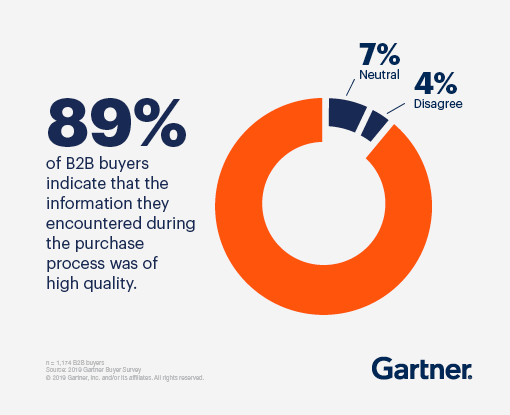Marketing trends come and go, but there’s one new strategy that’s not only sticking around, it’s rapidly gaining traction with businesses who are falling in love with its ability to engage with customers and generate revenue.
We’re talking about B2B Growth Marketing, which was ranked the #2 marketing trend in 2020 before jumping into the #1 spot last year.
Before discussing what it is, let’s explain what it is not. It isn’t conventional marketing that stops at casting a wide net for ‘likes’ and smiley faces on social media. That “top of the funnel”, awareness-only approach to marketing is very common and still very important, but as more businesses are finding out, these are empty calories that quickly leave them feeling hungry again – feeling hungry to prove marketing ROI.
B2B Growth Marketing takes a more thoughtful approach. It looks past the fizz of superficial attention and seeks deeper and long-lasting engagement that ultimately delivers more sales not only to new customers but also through retention and upsells to your existing ones.
This more impactful engagement throughout the customer and revenue lifecycle is becoming increasingly possible with the explosion of new marketing technology solutions and advanced data analysis that is transforming how companies find and retain customers.
Just as significantly, these new technologies are also transforming how customers expect to be reached. Today, we all want to be engaged with a more personalised experience.
B2B Growth Marketing is the hottest trend in marketing because it works. It helps bridge the marketing, sales and customer success functions, connecting businesses with new customers and turning these connections into relationships that generate significant long-term revenue.
It does that in part by having components of the marketing function at every step of the customer journey, from discovery to consideration to decision to delight.
Discovery
Back in the day, most marketing was an outward flow of information from the seller to the potential buyer. Companies sent up their flag and hoped people would bite, whether by cold-calling or placing ads on billboards.
But in the Internet Age, and especially during a pandemic that’s triggered a permanent spike in online activity, marketing has undergone a massive shift from outbound to inbound.
Now it’s the potential customer who is reaching out and initiating contact. They are self-directed and search-savvy, and they are out constantly scouring the Internet for ideas, products and suppliers. One study revealed that 71% of people are online looking for new products every single day.
Amid this flood of inbound attention, a business needs to ensure they can be discovered. And this means embracing an omnichannel strategy that creates as many opportunities to connect as possible.
By deploying a variety of touchpoints across owned, earned and paid channels for inbound marketing and coupling that with traditional outbound marketing, a business creates multiple runways to land potential customers.
A study by McKinsey found that some businesses are now using ten or more different channels, and these businesses are expanding market share at the expense of their peers.
Brazil is among the world’s leaders in omnichannel communication, with customers using an average of 11 channels. Who’s bringing up the rear? That would be businesses in Japan and France who are finding it difficult to move on from traditional in-person meetings with their customers.
The Internet has made discoverability key to business success, and omnichannel communication is key. But what comes next? After a potential customer arrives at a business’ door, what happens once they walk through that door?
This brings us to the next essential step of B2B Growth Marketing: connecting these potential customers with the resources they need to educate and inform themselves as they seek a solution. Enter Content Marketing.
In many ways, B2B Marketing is Content Marketing.
Consideration
Today’s B2B buyers have access to massive amounts of content. They often make decisions or create impressions well before direct contact with a sales rep.
Gartner found that B2B buyers are researching, learning and meeting with peers independently from suppliers about two-thirds of the time. They spend just 17% of their time meeting with suppliers — so if there are three potential suppliers, each gets only about 5% of a customer’s time.
As a brand, you need to create content to educate, inform and ideally influence the buyer along every step of his journey.
Content is the initial conversation between a company and a potential customer. The content strategy that informs what content is produced and where it can be found is based on research and an agile, iterative optimisation process.
The content optimisation needs to be customer-centric, answering their questions and reducing scepticism. You need to be the trusted source of information on your domain. Think of helping over selling and sales should come when the buyer is ready to buy.
Information now plays a role in driving sales effectiveness. In a world where information can move far more freely, access more people and be available across channels, information can do things today that individuals cannot.
— Brent Adamson, Principal Executive Advisor at Gartner
Decision
In B2B marketing, the customer journey usually involves a series of micro-conversions, baby steps towards the big goal.
Getting found in search for the phrase you want to be found for is a baby step driven by content strategy and SEO.
Having a website visitor consume more than one article on your website is a micro-conversion. That can come from having content relevant to the visitor, and having it easily accessible through good web design. Think “You Might Also Like” sidebars.
A whitepaper download in exchange for an email address is a micro-conversion, and an important one as the visitor has exchanged something of value (his email address) in exchange for something they perceive to be of value, your gated content.
The micro-conversions do not always lead to the macro conversion, but they are a part of the process.
In the B2B context, multiple stakeholders are typically involved meaning a level of consensus is required. That means you are not only targeting the decision-maker in your marketing but the various team members tasked with identifying the problem, exploring solutions, and identifying possible suppliers.
You want to reach each of them.
Delight
The “sale” is not the end of the customer journey but the beginning of a new phase in your relationship.
Customer retention is core to any business’s long-term success. Hubspot points out a few reasons:
- Affordability: It’s 6-7 times more expensive to acquire a new customer than to retain an existing customer.
- ROI: A 5% increase in customer retention can increase company revenue by 25-95%.
- Loyalty: Retained customers buy more often and spend more than newer customers. They’ve learned the value of a product or service and keep coming back, again and again.
- Referrals: Satisfied, loyal customers are more likely to refer their colleagues — bringing in new customers free of charge.
The Growth Marketer understands this and ensures marketing continues even after the initial sale.
Post-sale responsibilities of the marketing team can range from a stellar “Welcome” email campaign to crafting your customer’s positive experience into case studies to ensuring the Customer Success team has all the collaterals they need.
This virtuous circle of discovery, learning, growth and more discovery is the goal of B2B Growth Marketing and the key to the long-term success of businesses today.
And it is all focused on giving the customer information they trust to help them make an informed decision. Content marketing done well.




